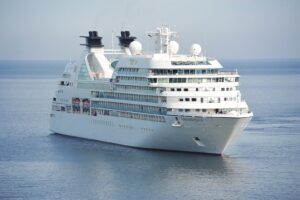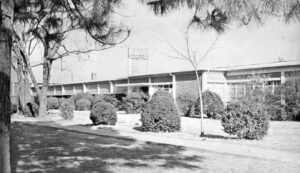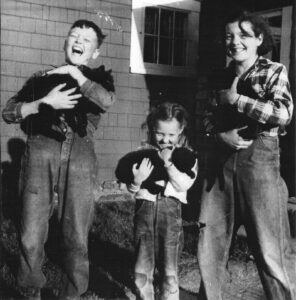My sister Ursula lived in Berlin. By 1989 she was chief oboist in the Theater des Westens, taught a number of oboe students, substituted at the Berlin Opera, and owned a woodwind repair shop. And she was in Berlin during the time when the Iron Curtain separating East from West began to crumble. The fall of the Berlin Wall was a foregone conclusion once Hungary opened its borders to Austria, which permitted more than 13,000 East Germans to board trains and flee to the West. On Thursday evening, November 9, 1989, the Wall “fell” when the border between East and West Berlin opened. In her words, continued:
Nov 12 Sunday afternoon there were many GDR (East German) cars parked, quite a “Trabi-Luft” [Luft=air] with their 2-cycle engines, quite a stinky exhaust. All 3 days West Berlin busses and subways (with reinforcements from West travel busses and East subway cars!) gave free passage to any GDR citizens. This morning the Philharmonic with Barenboim gave a free concert, this afternoon the Opera a free Zauberflöte (Mozart’s Magic Flute). Rock musicians from East and West gave a Deutschlandhalle [large indoor arena, capacity 9,500] free concert today.
So our Hans, bassoonist, Saturday evening got permission, after numerous refusals, including almost a year ago when his mother died, to go to Halle since his 92-year-old father is quite ill.
Almost everyone here has suddenly had visitors or relatives on their doorstep, even in the middle of the night. The atmosphere on the streets, starting Thursday night with noisy Trabis and honking etc. has continued even until today, with West Berliners standing at border crossings and applauding as East Berliners, no even East Germans, entered our city, many just for the opportunity of walking along Kudamm and looking in shop windows.
The mood in the streets, subway, crowded, tonight was a bit better since many East people must work tomorrow early, the mood was just a big happy family, as if everyone was just overjoyed at seeing one another, strangers speaking to one another. The word here is “Europhie” [combination of German for euphoria and Europe] and well, how long can this last? There are side effects now, and long range effects which can hardly be anticipated, for a start, just the traffic, the air, the pollution problem is a tremendous one.
Amazing also, at crossing points the border guards East & West were helping each other out, crossing the border either way to handle the huge amount of travel coming over and going back again, shaking hands, talking together. … Rostropovich (cellist) few in from Paris, got a folding chair at Checkpoint Charlie & sat down to play some Bach suites in celebration of these happenings – wow, great guy!
Monday Nov 20th: This weekend was better prepared for the rush from the East, but even Friday had almost a million visitors in this city of 2 million. Stores were again allowed to stay open as long as they liked. Today again long lines especially at grocery and electronic/radio stores. It is below freezing, so a radio station helped a city office coordinate people here who offered overnight stays to GDR visitors – several thousands were put up this way, by strangers. And more soup kitchens on the streets all over.
Sat Dec 2: Yesterday Wolf Biermann, critical writer and singer-songwriter who was forced into exile 12 years ago, was finally allowed to return to the GDR. He performed in Leipzig last night, to 1000s of people standing !! in a huge cold hall at the fair groups. Hours of talking and singing to an enthusiastic audience, and impressively wise, though critical. He spoke thanking Gorbachev for allowing all these changes to become possible, then sang a new song, also expressing all our hopes that Gorbi will be able to continue …
Yesterday was also a hot session in the East Berlin Volkskammer, beginning the criticisms and revelations of high party members’ “crimes” against the people and economy. Not long ago the first GDR TV team their (part officials’) exclusive villa area outside Berlin, showing the whole country, world, in what luxury they’d lived, what the stores stocked in expensive Western goods and exotic fruits and foods. An outrage!! Yesterday it also came out that some, including Honnecker, head of the GDR government, had moved lots of money into Swiss bank accounts. Also how many party officials owned private firearms.
Sund Dec 3 Often I’ve thought this chronicle can end, and then incredible new things keep happening — today the emergency session of GDR’s Communist party resulted in the resignation of the total Politbüro [communist party central committee]. A few high-up officials have been arrested already. This is so fast and so unbelievable: just a month ago the borders weren’t yet open.
Last night, Saturday, TV broadcast a concert of the Bavarian Radio Symphony (West, conducted by Colin Davis) and Leipzig (East) choirs performing Beethoven’s 9th Symphony in Leipzig. As the recitative text began, last movement, the whole audience stood, many with tears in their eyes, and many musicians on stage visibly very moved also. A new era has indeed broken in, long only dreamed of.
And this weekend, Bush & Gorbachev meeting in Malta, despite stormy weather an upbeat mood. More interesting almost for me is how the US and NATO will respond, regroup to meet such immense changes in world politics. Really a chance of a lifetime, for our whole endangered planet. I think of you older generation, living under fear of another war in Europe, or us younger, growing up only with “cold war” — what totally new options are suddenly open, what hope for us all!
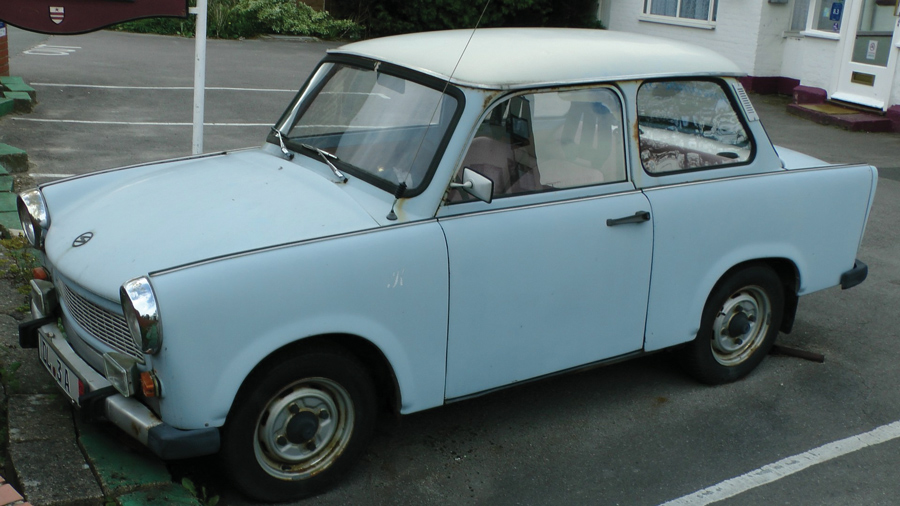
The Trabant, or Trabi as it was affectionately called, was an inexpensive East German auto, the only automobile available to most East Germans, although party VIPs could acquire the more expensive and reliable Wartburg. Trabi owners typically paid much more than a year’s wages, in advance, waited 10-13 years for delivery, and carried replacement parts in their vehicles to cover the frequent repairs. The Trabi sported a 2-stroke 18hp engine and was made from recycled waste. It had no seat belts, fuel gauge, fuel pump, or turn signals. Until stations started selling pre-mixed fuel, refueling required the driver to open the hood, add gas as well as oil, and then mix the combination. The smoke coming out of a Trabi was foul and thick and a huge source of pollution. In East Germany, a used Trabant sold for double the price of a new one because it avoided the 10 year wait for delivery. When the Wall came down, the Trabi became obsolete almost overnight.
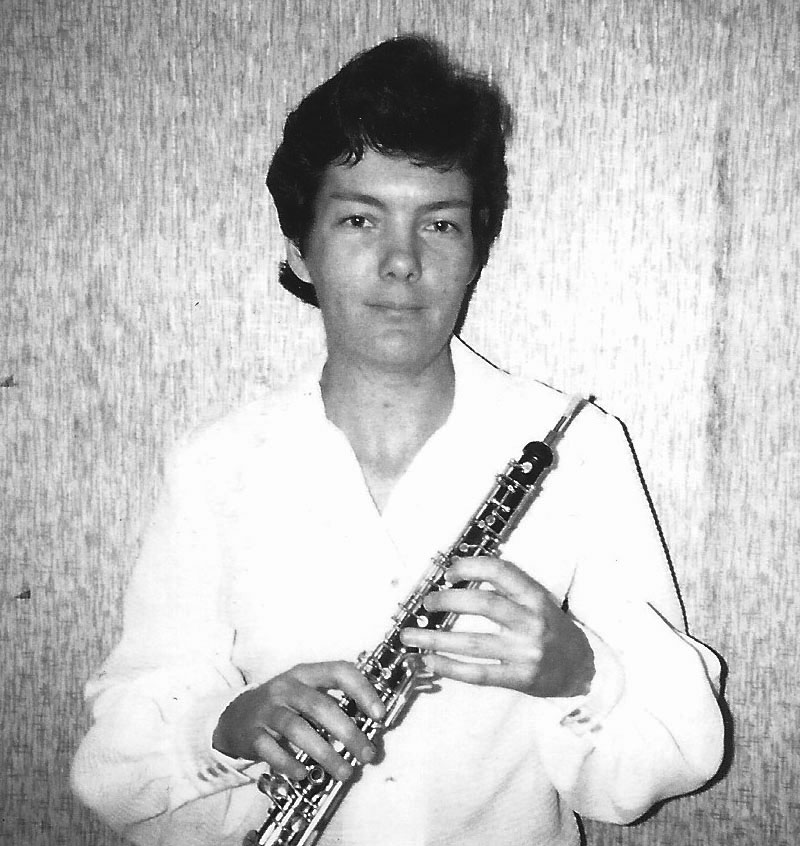
In the middle of one night, my sister’s doorbell rang at 4 am. Her shop was the first floor of her residence. The visitor was an oboe player from Czechoslovakia who had driven through the night to her shop in Berlin, where he could purchase higher quality reeds for his instrument. This spontaneous middle-of-the-night visit was not unusual during this time – clocks become irrelevant when the boundaries begin to fall.
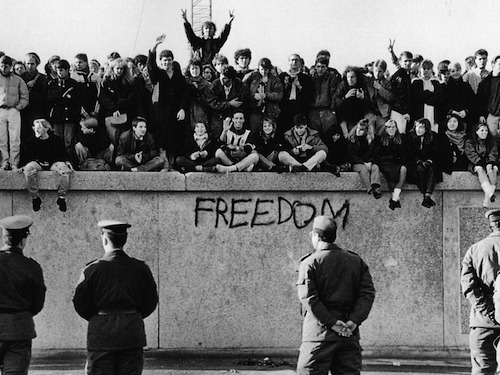
In November of 1989 the dreaded Berlin Wall became a place of celebration.

